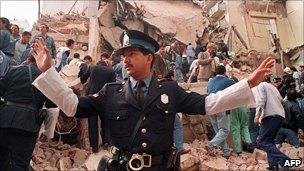Argentina welcomes Iran offer in 1994 bombing inquiry
- Published

Monday marks the 17th anniversary of the deadly bombing
Argentina has welcomed a reported offer from Iran to assist in the investigation of the 1994 bombing of a Jewish centre in Buenos Aires.
The foreign ministry said they had yet to receive a formal word from Tehran but if confirmed, the offer would be "unprecedented and positive".
Argentina blames Iran for the 18 July attack, which killed 85 people.
The Iranian government, which denies any involvement, has said it is ready to help solve the case.
Monday marks 17 years since the Israeli-Argentine Mutual Association (Amia) building was destroyed by a car bomb.
It was one of two attacks targeting Argentina's 200,000-strong Jewish community in the 1990s.
The 1992 bombing of the Israeli embassy in Buenos Aires that left 29 dead also remains unsolved.
Argentina has said it will publish a report into the attacks in the coming days.
Minister wanted
Reacting to Iran's offer, the Argentine foreign ministry said it hoped to receive an official communication from its Iranian counterpart.
"But if confirmed this would be an unprecedented and positive overture from the authorities in the Islamic Republic of Iran in the Amia case, " a ministry statement said.
The Iranian foreign ministry said at the weekend it was "ready for a constructive dialogue and to co-operate with the Argentine government to shed all possible light" on the Amia case.
A statement published by the state news agency, Irna, condemned the attack and sent its sympathies to the victims.
But it also said Argentine prosecutors had unfairly accused Iranian citizens.
Iran's current Defence Minister, Gen Ahmad Vahidi, is wanted by Argentina for allegedly masterminding the Amia bombing.
Since 2007, Interpol has had a red notice in place for Gen Vahidi,, external informing its 187 member countries that Argentina is seeking his arrest.
At the time of the attack, Gen Vahidi was the commander of a special unit of Iran's Revolutionary Guard known as the Quds Force.
- Published17 July 2011
- Published1 June 2011
- Published31 March 2011